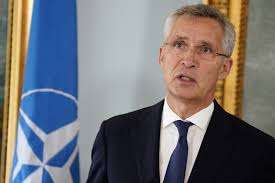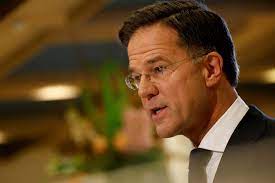The United States and the United Kingdom have thrown their weight behind Dutch Prime Minister Mark Rutte’s bid to become the next Secretary-General of NATO.
This endorsement comes at a critical juncture for the alliance, as it confronts significant challenges by Russia’s actions in Ukraine and uncertainties surrounding the US commitment to transatlantic relations.
According to a US official, “President Biden strongly endorses PM Rutte’s candidacy to be the next secretary general of NATO.”
Similarly, a UK official stated that London “strongly backs” Rutte as the successor to Jens Stoltenberg.
The UK official emphasized Rutte’s robust credentials in defense and security, underlining his potential to uphold NATO’s strength and readiness to counter threats.
Many other NATO members have signaled their willingness to support Rutte for the position, emphasizing the need for unanimous approval from all members of the alliance.
Mark Rutte, one of Europe’s longest-serving heads of government, has held the position of Prime Minister since 2010.
He is seen as a dependable and well-positioned leader to navigate the challenges posed by potential changes, such as Donald Trump’s possible return to the White House.
A senior diplomat, however, cautioned that Rutte’s endorsement was not a done deal and that his endorsement by ‘big countries’ did not mean all allies supported him.
Mark Rutte: A Suitable Candidate For NATO’s Top Position
Advocates highlight that the Dutch leader is among the most well-connected politicians in Europe.
Mark Rutte is also known for his grounded nature, often cycling to meetings and even dedicating time to teaching social studies at a local school.
One Dutch official said, “Rutte’s strength lies in three things: his people skills, his pragmatic mind, and his Nokia (recently an iPhone).”
“A convinced Atlanticist and admirer of [Winston] Churchill, his phone book by now spans two generations of world leaders beyond the confines of the western world and with whom he has forged bonds and maintains good contact – also in private, even after their departure. [The former German chancellor Angela] Merkel and Rutte still meet up,” the official said.
“He had a great bond with [the former US president Barack] Obama but also maintained constructive ties with Trump. And while his domestic legacy is now perhaps called into question his international credentials are excellent,” he added.
Following the collapse of his government last year, Rutte relinquished his position as leader of the People’s Party for Freedom and Democracy (VVD) and announced his intention to retire from politics.
However, in the subsequent months, he assumed the role of caretaker prime minister amid prolonged coalition talks and remained actively engaged in European politics.
This sustained involvement has led to increasing speculation at NATO headquarters that he is a contender for the top position.
In recent years, a concerted effort has been to diversify NATO’s leadership, traditionally held by men from Western Europe. Some officials had anticipated the possibility of the alliance appointing its first female leader or someone from its eastern flank.

The current general secretary, Jens Stoltenberg, hails from Norway, succeeding his immediate predecessor, Anders Fogh Rasmussen of Denmark.
Notably, Dutch officials previously occupied the post thrice: from 1961-64, 1971-84, and 2004-09.
Amid early speculation surrounding Stoltenberg’s successor, there were mentions of Estonian Prime Minister Kaja Kallas as a potential candidate.
Additionally, Latvian Foreign Minister and former Prime Minister Krišjānis Kariņš recently showed interest in the role.
Also, Ben Wallace from the UK was proposed but did not generate enthusiasm.
However, with the backdrop of Russia’s ongoing conflict and the nuanced responsibilities inherent in the job – certain governments hinted that they view Baltic candidates as too assertive for the position.
READ ALSO: UK’s Nuclear Test Launch Fails Again




















